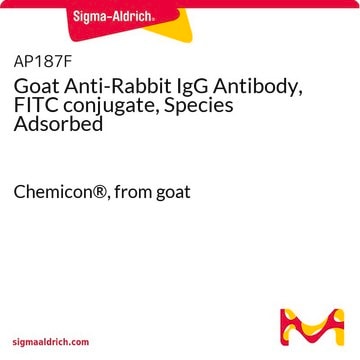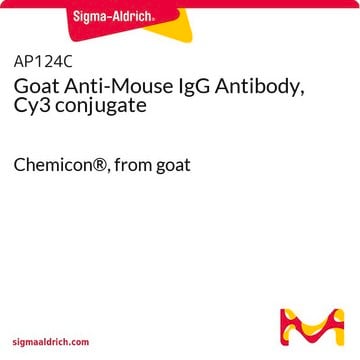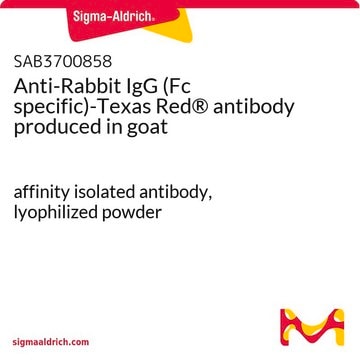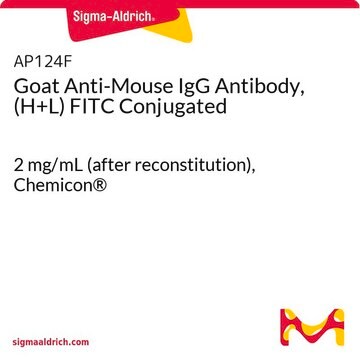AP106F
Rabbit Anti-Goat IgG Antibody, FITC conjugate
Chemicon®, from rabbit
Sign Into View Organizational & Contract Pricing
All Photos(1)
About This Item
UNSPSC Code:
12352203
eCl@ss:
32160702
NACRES:
NA.46
Recommended Products
biological source
rabbit
Quality Level
conjugate
FITC conjugate
antibody form
F(ab′)2 fragment of affinity isolated antibody
antibody product type
secondary antibodies
clone
polyclonal
species reactivity
goat
manufacturer/tradename
Chemicon®
technique(s)
immunofluorescence: suitable
shipped in
wet ice
target post-translational modification
unmodified
Related Categories
Specificity
Goat IgG (H&L)
FLUOROPHORE/PROTEIN:
Approximately 7.2 mg/mg; 2.7 moles FITC per mol IgG
FLUOROPHORE/PROTEIN:
Approximately 7.2 mg/mg; 2.7 moles FITC per mol IgG
Immunogen
Purified Goat IgG.
Application
DILUTION:
Suggested dilution for most applications: 1:50-1:200
Optimal working dilutions must be determined by the end user.
Suggested dilution for most applications: 1:50-1:200
Optimal working dilutions must be determined by the end user.
Detect Goat IgG using this Rabbit anti-Goat IgG Antibody, FITC conjugate validated for use in IF.
Physical form
Liquid in 0.01 M Phosphate buffer, 0.25 M NaCl pH 7.6 with 15 mg/mL BSA, 0.01% Thimerosal and 0.05% sodium azide.
RECONSTITUTION:
Reconstitute to 1 mg/mL with sterile distilled water.
RECONSTITUTION:
Reconstitute to 1 mg/mL with sterile distilled water.
Storage and Stability
Maintain lyophilized product between 2 and 8°C for up to 12 months. After reconstitution the product is stable for several weeks at 2-8°C as an undiluted liquid. For extended storage after reconstitution, add an equal volume of glycerol to make a final concentration of 50% glycerol followed by storage at -20°C in undiluted aliquots for up to 12 months. Please note the concentration of protein (and buffer salts) will decrease to one-half of the original after the addition of glycerol. Avoid repeated freeze/thaw cycles.
Legal Information
CHEMICON is a registered trademark of Merck KGaA, Darmstadt, Germany
Not finding the right product?
Try our Product Selector Tool.
Hazard Statements
Precautionary Statements
Hazard Classifications
Aquatic Chronic 3
Supplementary Hazards
Storage Class Code
11 - Combustible Solids
WGK
WGK 3
Certificates of Analysis (COA)
Search for Certificates of Analysis (COA) by entering the products Lot/Batch Number. Lot and Batch Numbers can be found on a product’s label following the words ‘Lot’ or ‘Batch’.
Already Own This Product?
Find documentation for the products that you have recently purchased in the Document Library.
Rineke de Jong et al.
Nature communications, 13(1), 6142-6142 (2022-10-18)
Respiratory syncytial virus (RSV) infection causes a substantial lower-respiratory-tract disease burden in infants, constituting a global priority for vaccine development. We evaluated immunogenicity, safety and efficacy of a chimpanzee adenovirus (ChAd)-based vaccine candidate, ChAd155-RSV, in a bovine RSV (bRSV) challenge
Taoran Chen et al.
Vaccines, 11(8) (2023-08-26)
H7N9 avian influenza virus (AIV) has caused huge losses in the poultry industry and impacted human public health security, and still poses a potential threat. Currently, immune prevention and control of avian influenza relies on traditional inactivated vaccines; however, they
Hui Shi et al.
Folia histochemica et cytobiologica, 56(3), 141-150 (2018-09-07)
High levels of reactive oxygen species (ROS) have potential toxic effects on testicular function and sperm quality. Peroxiredoxins (PRDXs) are enzymes with a role as ROS scavenger. The aim of the study was to reveal the presence and localization of
Efficient In Vivo Delivery of siRNA Into Brain Capillary Endothelial Cells Along With Endogenous Lipoprotein.
Kuwahara H, Nishina K, Yoshida K, Nishina T, Yamamoto M, Saito Y, Piao W, Yoshida M et al.
Molecular Therapy null
Juhui Qiao et al.
Molecular medicine reports, 25(6) (2022-05-12)
The aim of the present study was to examine the neuroprotective effects of a panel of active components of ginseng and to explore their molecular mechanisms of action in two rotenone (Rot)‑induced models of Parkinson's disease: An in vitro model using
Our team of scientists has experience in all areas of research including Life Science, Material Science, Chemical Synthesis, Chromatography, Analytical and many others.
Contact Technical Service







